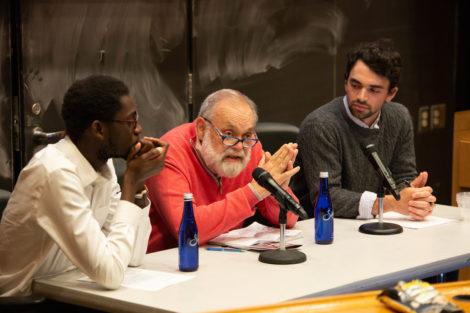October 21, 2019 –For public health practitioners, malaria is a daunting foe. More than 200 million people become sick with it annually, and more than 400,000 people die from it each year, many of whom are children under the age of 5. On top of that, the parasites that cause the disease can rapidly evolve to become resistant to available medications.
Despite the staggering burden, researchers and public health organizations are calling for malaria to be eradicated by 2050. It is without a doubt a bold ambition. But is it attainable?
That was the focus of a point-counterpoint discussion on Tuesday, October 8 at Harvard T.H. Chan School of Public Health. The event, part of Worldwide Week at Harvard, featured presentations from students and professors debating the feasibility of malaria eradication.
During opening remarks, Marcia Castro, Andelot Professor of Demography and chair of the Department of Global Health and Population, noted that the world has made significant strides in the fight against malaria. Between 2000 and 2015, Castro noted, cases of malaria declined by 22% and deaths declined by 50%. “But what we’ve seen since 2015 is that those achievements in reducing deaths and cases have really stalled,” she said. “In fact, between 2015 and 2017 we had increases in cases of malaria in 55 countries and we had increases in death due to malaria in 38 countries.”
Nicholas Arisco, a PhD candidate in population health sciences, presented an argument that the world is capable of eradicating malaria by 2050. Arisco opened his presentation by contending that eradication by 2050 is the only “just and ethical” path forward. In making his case, Arisco pointed to new technologies that are emerging to help fight malaria, increased governmental investments in malaria control programs, and the fact that 20 countries eliminated malaria between 2000-2015.
Presenting the other side of the argument was Esias Bedingar, an SM candidate in global health and population. He noted that eradicating malaria is an important effort that would be enormously beneficial to some of the world’s most vulnerable populations, but that a target date of 2050 is unrealistic. In exploring the obstacles to malaria eradication, Bedingar pointed to significant infrastructure improvements that are required in high-burden countries, such as paving roads and building water drainage systems, which could help reduce mosquito populations and in turn reduce transmission of malaria-causing parasites.
Caroline Buckee, associate professor of epidemiology, then talked briefly about how groups that help shape public health policies have different opinions on malaria eradication She noted, for instance, that the World Health Organization (WHO) is conservative on the prospect of eradication by 2050.
After Arisco and Bedingar made their cases, they participated in a debate moderated by Richard Cash, senior lecturer on global health. While discussing the issue of finances needed for malaria eradication, Arisco suggested that this isn’t about just asking for greater investments into malaria control, it’s about asking for greater investments into health systems as a whole. “That’s a fair ask,” Arisco said.
While the feasibility of eradication by 2050 remains debatable, both Arisco and Bedingar agreed that it’s an ambition worth pursuing.
photo: Sarah Sholes
